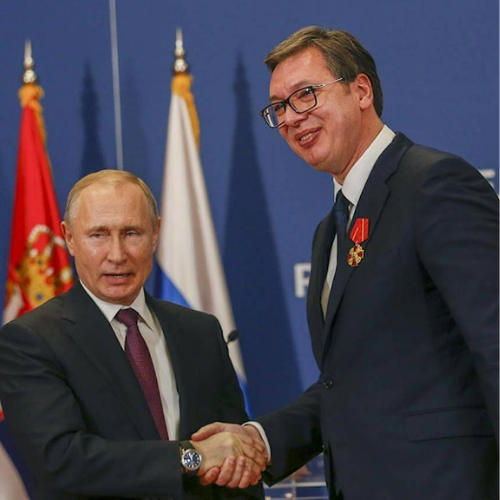In a recent announcement, Serbian President Aleksandar Vučić has expressed his gratitude to Russian President Vladimir Putin for supplying gas to Serbia and made it clear that his country will not impose sanctions on Russia, despite pressure from Western nations. This decision comes at a time when many countries, particularly in Europe, have imposed strict sanctions on Russia due to its ongoing invasion of Ukraine. However, Serbia has taken a different path, choosing to maintain close ties with Moscow.
Serbia’s Energy Security Depends on Russian Gas
Energy, particularly gas, plays a crucial role in Serbia’s economy and daily life. The country relies heavily on natural gas for heating homes and powering industries, especially during the harsh winter months. President Vučić recently shared on Instagram that he spoke with Russian President Vladimir Putin for the first time in more than two years. During this phone call, he expressed his gratitude to Putin for ensuring a steady supply of gas to Serbia, which has become even more important as global energy markets face disruption due to the war in Ukraine and international sanctions against Russia.
Vučić described the conversation as positive and said it would help deepen the trust and cooperation between Serbia and Russia. This show of gratitude highlights Serbia’s dependence on Russian gas for its energy security. While many European countries have reduced or completely cut off their reliance on Russian energy, Serbia has chosen a different path, maintaining close economic ties with Russia.
As winter approaches, having access to affordable and reliable gas is critical for Serbia. By continuing to import gas from Russia, Serbia is ensuring that its citizens and businesses have the energy they need, despite the geopolitical turmoil that has affected energy prices and supplies across Europe.
Serbia Refuses to Impose Sanctions on Russia
One of the most important aspects of Vučić’s recent announcement is Serbia’s ongoing refusal to impose sanctions on Russia. Since the beginning of Russia’s invasion of Ukraine in February 2022, Western countries have imposed a series of strict sanctions aimed at punishing Russia for its actions. These sanctions have targeted Russia’s economy, its ability to export goods, and its financial systems. However, Serbia has not followed suit.
Cuba’s Sanctions Crisis: A Powerless Nation Faces Dire Consequences
Vučić has repeatedly emphasized that Serbia will not impose sanctions on Russia, even though many Western countries, including members of the European Union (EU), have been pressuring Serbia to align with their policies. The refusal to impose sanctions is largely based on Serbia’s close historical, cultural, and political ties with Russia, as well as its reliance on Russian gas. Vučić has explained that Serbia’s decision to not sanction Russia is driven by its national interests. As a candidate for EU membership, Serbia is expected to align with EU foreign policy, but it is not legally required to do so at this stage. Therefore, Serbia is not obligated to follow the EU’s lead when it comes to sanctioning Russia.
Despite the war in Ukraine, Serbia has maintained a neutral stance, trying to balance its relationship with both Russia and the West. While Serbia supports Ukraine’s territorial integrity, it has stopped short of taking concrete actions against Russia, such as sanctions, to preserve its access to essential gas supplies. For Vučić, ensuring that Serbia’s economy continues to function smoothly is a top priority, and cutting off Russian gas would severely disrupt the country’s energy supply.
BRICS Invitation: Strengthening Global Ties
Another important outcome of Vučić’s conversation with Putin was the Russian leader’s invitation for Serbia to attend an upcoming BRICS summit in Kazan, Russia. BRICS is a group of five major emerging economies: Brazil, Russia, India, China, and South Africa. These countries often collaborate on global political and economic issues, providing an alternative to Western-dominated institutions like NATO and the European Union.
While Vučić has not confirmed whether he will attend the summit, the invitation itself signals that Serbia continues to be seen as a valuable partner for Russia and other non-Western powers. The BRICS summit will focus on cooperation between these emerging economies, and for Serbia, attending such a summit could open new avenues for partnerships, particularly in terms of energy and gas agreements.
As Serbia navigates its future on the global stage, participation in events like the BRICS summit could help it develop stronger ties with countries outside the West, while still maintaining its dialogue with the EU. Serbia’s position in the energy market, especially its reliance on Russian gas, makes its role in international discussions even more important.


